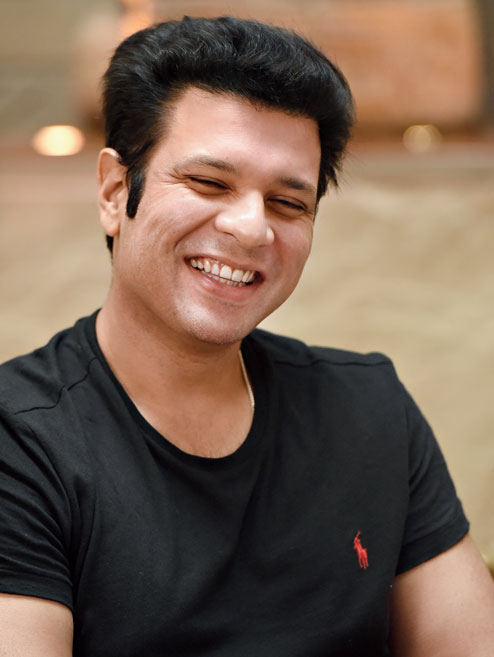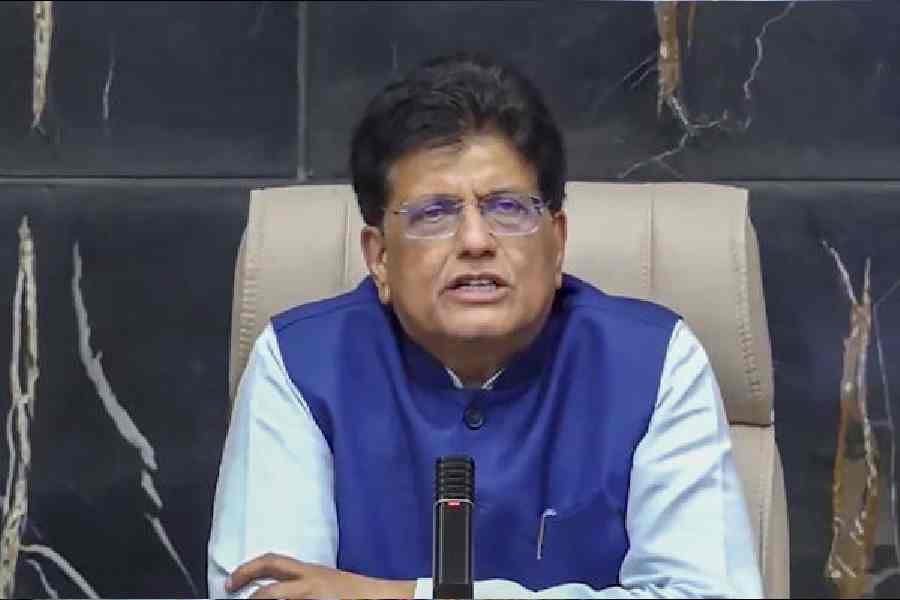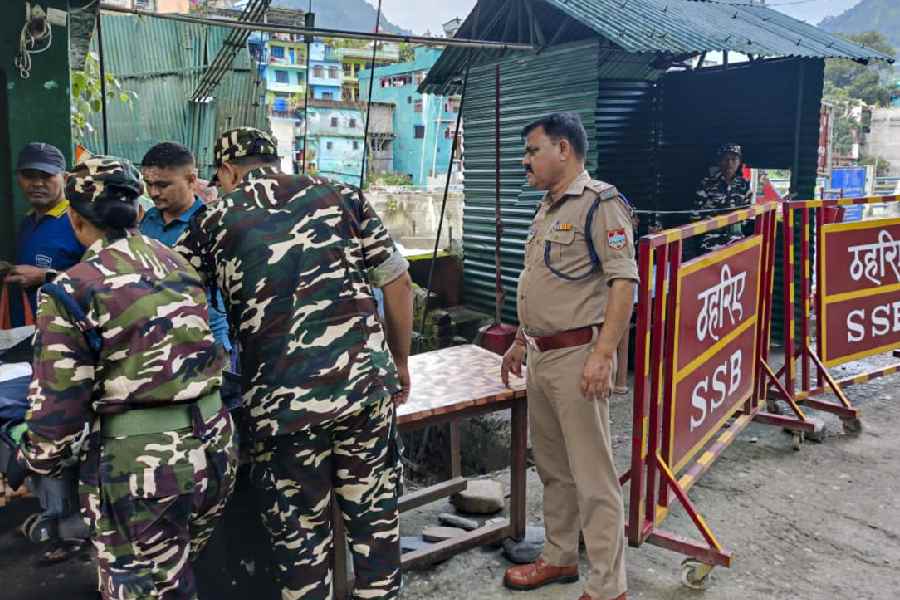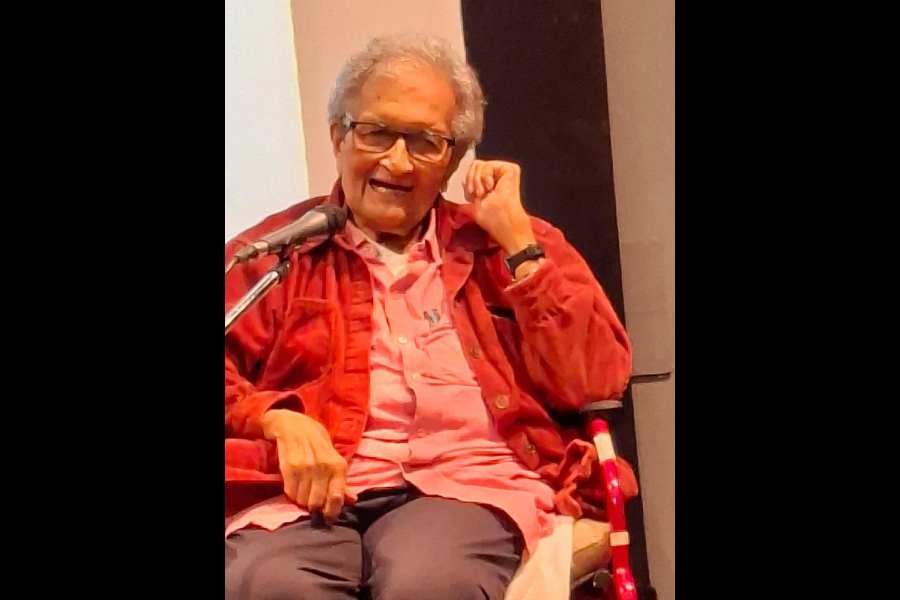
My sarod is my best friend, my companion. Whoever I am today is all because of this instrument. It’s given me everything. It’s the connect between my father and me, it’s that thread that holds the relationship. I have had one major sarod throughout my career... Subhalakshmi (his mother’s name) is what I call it
Sibendu Das: Let us start with a few firsts; can you take us back to the first moment you remember plucking the strings of the sarod?
Amaan Ali Bangash: Well, I don’t remember that particular moment when sarod was introduced to me, but I remember moments. There were days I was enjoying doing that, days when I didn’t want to do it. I must have been about five-six years old then. I have these images in my mind of my father (Amjad Ali Khan) teaching Ayaan bhai and me, telling me to concentrate more… and I didn’t have any interest at that time. I think it grew on me, and that’s good. I was not very inclined towards it initially, especially the discipline. I was a restless child. It took me time to understand the whole procedure of learning and listening.
Sibendu: The first moment when you realised that your father is a celebrated musician?
Amaan: Kids are smart — and today’s kids are very smart (laughs). By the time I was eight-nine, I had figured out that he is somebody important because people are looking at him, following him, autographs are happening… so I figured out kuch toh hain yeh (laughs). But by the time I was 13-14, I think I started realising that this is my world, this is pretty much what I will be doing for the rest of my life. There was a little resentment, though, initially. I did not understand was this really what I wanted to do. That’s normal, you know. So, I think 13-14 was when I realised what might be my responsibility.
Sibendu: The first moment when you performed on stage?
Amaan: When I was 10, my mother packed me off with my father to Russia for Festival of India. In our industry, music is a way of life, it’s not a part of life. There’s a whole preparation. How you behave in front of an audience… uthna, baithna, and other norms that you have to learn. I remember playing in Moscow, St. Petersburg, Minsk… I enjoyed the stage. There was a lot of adulation towards my father, so I figured out that this is something very important and if you do it well, you’ll be loved and respected. That is how they introduced music to me, with the perks that come with it.
My first proper concert, I think, was when I was 11, at a sarod festival... Ayaan bhai and I were the young ones there... he was nine, I was 11.
Sibendu: The first time you were disappointed with the way you played?
Amaan: I’m still not very happy with how I play on stage, because I feel for any creative person, the day you are happy with yourself, that’s the end of your growth. And I have heard very good music as a child, not only from my father, from all legends, in sarod, sitar, tabla… and I know where the pinnacle is, and I know where I am, and I know how much I need to really pull up my game to go there. But there have been many concerts that have been embarrassing. One was in London when I was 13… and because of those bad concerts, today I feel I have the fire burning inside me to do better.
Sibendu: The first time you realised that you needed to dedicate yourself completely to the sarod?
Amaan: I think when your parents’ vision becomes your vision and your dream, that’s a defining moment. But it should not be forced on you.... I was never good in studies, I was good in sports, and music. But seeing the sports situation of our country, I don’t think much would have happened with me (chuckles), so I figured that this is a better path for me, where my guru is my father, and the goodwill he has generated from everybody over the years will come to me, but the hard work has to be put in. Obviously there’s a payback time. I didn’t want to be one of those musicians who are big father’s kids and today behind their back people talk ill of them. I was very scared of that, I was very conscious of that. So by the time I was 15, I started putting in four-five hours of riyaaz every day.

Sibendu: What sport did you play?
Amaan: Pretty much everything, apart from hockey. I was in my school cricket team, football, basketball, I was the second-fastest runner in Delhi under-16… don’t go by my size now (laughs). Even now I play tennis pretty often.
Sibendu: The first moment when you were really happy with how you played on stage?
Amaan: If I have to pick one, I was 16 and I played with Ustad Zakir Hussain in Nehru Centre, Mumbai. I played Raag Puriya Kalyan and after the concert, my father came backstage and said, ‘I am very proud of you’....
Samhita Chakraborty: What does it mean to be Hafiz Ali Khan’s grandson and Amjad Ali Khan’s son? Is being the seventh unbroken generation of the Senia-Bangash lineage an enormous pressure or pure privilege?
Amaan: (Touches his ear in respect at the mention of his grandfather’s name) It’s a privilege. See, you create the pressure, and pressure is good. Someone can be the 31st generation and not feel the pressure, feel that ‘I am khaandaani, blue blood’. But I feel every generation has to redefine its existence. What you are getting is a gift… but what you do with the gift is what matters. When youngsters ask me, what is your mantra, I always say have fun in life, and work hard.

Sibendu: Talking of hard work, can you take us through a day in your life?
Amaan: It’s very erratic, very boring. Sometimes I get up at 7 and start practising and sometimes the whole day I am just lying down on the bed, not even knowing what to do. So I have to discipline myself. Five days I’ll go to the gym, then 10 days I’ll eat out of control (laughs), then 10 days I’ll practise for six-seven hours a day, then 20 days I’ll not look at the sarod. I go into extremes… but I think that’s my personality.
Coming back to your question, on a usual day, morning is my coffee time, news time. Then I go and spend time with my parents. I live on the first floor (in Delhi), my mother (Subhalakshmi) and father on the second floor, so I go meet them, which I feel works like a battery charger for me. What do you call it... adda? Ya, adda for an hour. And then I go back and do my riyaaz, till lunch is served. Three-four hours. But for me it’s not work... more like meditation.
Since my mother’s from the eastern side (Assam), I have the habit of sleeping in the afternoon (laughs heartily). Then I push myself to go to the gym. I hate going there. Evenings are again family time, listening to some music, friends coming over, or going out with them for dinner…. Usual, not exciting or glamorous.
Samhita: How would you describe your relationship with your sarod?
Amaan: It’s my best friend, my companion. Way back, once I told my father, ‘I don’t have true friends.’ He pointed to my sarod and said, ‘This is your best friend. Give it time. Everybody will leave you one day but this person will never leave you if you give it time. So invest in this person.’ I took it seriously. Whoever I am today is all because of this instrument. It’s given me everything. It’s the connect between my father and me, it’s that thread that holds the relationship.
Sibendu: How many sarods have you had?
Amaan: I started off in 1992 with an instrument which I played till I was 18. Then I changed it and I have had one major sarod throughout my career… in the middle I used a bigger sarod but I didn’t enjoy the tone of it, so I have gone back to my old sarod.
Samhita: Do you have a name for it?
Amaan: Not really… (smiles). Well, I called it Subhalakshmi, then I called it Gangotri… I think Subhalakshmi is what I call it.
Debolina Banerjee (student of Shri Shikshayatan College, who is learning Indian classical vocal): What is your favourite raag?
Amaan: I don’t have one particular, but Rageshree is one, Shree is one, Puriya Kalyan is one, these are raags that have been my companions, and they have taken me through my most difficult times, when I have struggled on stage.
Sibendu: And one raag that you are yet to master?
Amaan: Two raags I want to start performing this season — Bhairavi and Darbari. These I have always stayed away from, not because I don’t know them... it’s just that I felt I am not mature enough to perform it. And I’ve heard Darbari from Amjad Ali Khan saab, Ravi Shankar ji, Vilayat Khan saab… so when you have heard from them, you do it not to prove a point to the audience but do it if you think you are honest to a raag. Till I feel my standard of Bhairavi is not good, I will not give it to the world.
Malancha Dasgupta: What other genres of music do you listen to?
Amaan: A lot of Bollywood. As an Indian, I’d be lying if I said I didn’t (smiles). I mean movie songs… I enjoyed the south Indian version of Robot more than the Hindi version, because it gave you that kick. Arijit Singh is the new flavour. Sunidhi (Chauhan) is very good, Shreya Ghoshal is amazing, Sonu (Nigam)…. Then I like Sufi music, I love Punjabi, because my friends are Punjabi — fortunately or unfortunately (laughs) — and in western, I like old-school — Akon, Tracy Chapman, Bryan Adams, sometimes (DJ) Tiesto….
Sibendu: But you have no plans of composing film music yourself?
Amaan: Ab koi poochhe toh! Main toh baitha hoon (laughs). My brother and I did get offers but nothing worth it. I feel do it if you are remembered for it. Otherwise, no rush.
Samhita: What is it to be a young Indian classical musician in a world where the youth are increasingly getting addicted to DJs and EDM?
Amaan: But they all come back after 35, no? (Everyone bursts out laughing) When the knees are getting weaker, they want to sit and hear music. I have a lot of 20-year-olds coming, then for 10-15 years I lose them to EDM, then they come back by 36-37, when they are married and with kids. Beech mein they forget me!
See, I’m not saying Indian classical music is the culture of India. The real culture of India is film songs. Indian classical music or dance is an acquired interest. A wrong notion has been created that young people don’t like classical. Because I think unfortunately certain people have given out the message that it’s dying. It’s not.
Today ghazal is still there, but there are no performers. That’s why you say ghazal is going down. When you had the greats of Indian classical music, Ravi Shankar ji, or Vilayat Khan saab, Bismillah Khan saab or Bhimsen Joshi ji, no one said it was going down. Today there are less of them and people like us or few years elder to me, the middle generation, unfortunately couldn’t generate that spark with youngsters. It’s the performers who get the graph down of a genre of music, the genre doesn’t go down.
If I ask you to name ghazal singers, after Jagjit Singh, there’s a vacuum. For bhajan, apart from Anup Jalota, there’s no other name. If there were 10 of the level of Anup Jalota, bhajan would be kicking on a different level….
Samhita: You said Indian classical music has to be made friendlier for youngsters. How do you think that can be achieved?
Amaan: See, EDM is not introduced to youngsters, they pick it up, because it is not forced on them. Unfortunately, in schools and colleges, they put classical music right here, in your face. Dhoop hai, wahan baitha diya bachchon ko chaar ghante, ki aaj yeh Khan saab gaayenge, woh Dhrupad chal raha hai... no one understands what’s happening! Vocal music should be introduced later, first get into instrumentals. Start with the tabla because kids can relate to the tabla, it’s more fun. Make it slightly glamorous. Get a good musician, I don’t mean a popular musician, I mean a musician who can, as you say, rock. Present it in a nice way. Lights lagwa do thode, mike system achha kar do, tell the students, ‘You know what, you are gonna have fun today’. Clap when you want, whistle when you want….
Sibendu: Really?! That’s exactly the opposite of our perception of classical music…
Amaan: But that’s wrong! You are not going for someone’s shraaddh, na? Nor a museum. What is music? It is entertainment. A lot of people say music is meditation. Ya, but in the house. You are not on stage to educate, you are on stage to make them enjoy and make them forget their problems. If you want to educate, call them home and educate them (laughs). You have to connect with the audience, you cannot expect them to connect with you. Because they have paid for you, you have not paid for them. I’m not saying they have to take their shirt off and dance but they must enjoy. If they want to take a photograph, it’s okay, how does it matter?
Samhita: Your father recently used the hashtag #betweenthenotes. So, tell us a bit about Amaan #betweenthenotes
Amaan: You want to know my dark secrets (laughs)? It’s very funny, you know, when I hold the sarod I feel like a musician, when I don’t, I’ve had people tell me, ‘Behave like a musician’! I ask how do I behave like one? Wear kurta-pyjama? Not talk? Put a paan in my mouth?! My mantra is simple: work hard, be respectful, have fun… and always praise others. It’s very easy to criticise... but jealousy only burns you from the inside. A lot of people do that behind my back.. criticise me, but that’s their journey. You also feel important (smiles)….
Samhita: Criticise you for what?
Amaan: Music is such an individual thing that everyone thinks they know it. It’s like cricket… ‘Arrey woh shot mein bat aise ghumana chahiye tha!’ And the worst is when youngsters criticise elders. All this social media scares me. Like, on YouTube people writing stupid comments and even commenting about elders! It’s not a nice practice.
Debolina: You have a private Instagram account. What kind of pictures do you post there?
Amaan: I, me, myself... obsessed (laughs). It’s fun. More than just pictures, I think it’s the whole thing you can do with pictures — lighting, contrasting and all this timepass you can do. I am not very good with social media. I used to have a Facebook account, which I stopped. There’s a Facebook page now, which Ayaan bhai handles.
Debolina: Your favourite Instagram filter?
Amaan: The first one... that darkish, groovy one (Clarendon). I think Instagram is a lot of fun. It is better than Facebook. On Facebook you get too much knowledge of who’s doing what and where… seriously! I got out of it because I don’t want to know so much about others. I am on Twitter also. Ayaan bhai just gave me my account now, a week back. Now I am handling my Twitter account myself.
Samhita: In January you mentioned you were ready to get married now. Were you flooded with proposals after that?
Amaan: I have always been ready, woh saamne wala ready nahin hota hai na… (laughs). I think there is a time… in your early age when you pretty much can get married easily. As you grow older your vision becomes a bit narrow, then you feel that itne saal nikal gaye, now what if I get married to the wrong person or what if she gets married to the wrong person (points at himself)?
I am a musician. I have even heard from a girl that your music is very good but what if you break your hand tomorrow, how will we earn? Such questions have made me more scared. So I think thoda sa dar baith gaya andar, to get married. But I believe in the institution of marriage and I want to have kids. But till you don’t feel this is that person…. And, age is just a number. It’s just that you want to be with the right person, and not cause hell for the other person or cause hell for yourself. I have started meeting a few people now through friends and all.
Samhita: So you are dating?
Amaan: Not dating. I am dating myself these days (chuckles). I think for me the problem has always been that whenever I have dated somebody I have always thought of marriage. I was like, ‘shaadi karna hai, shaadi karna hai, shaadi karna hai’. I was like that Ali (Uday Chopra) in Dhoom. Every time he sees the girl, he starts imagining marriage and kids. Now I have taken a step back and I am like, ‘jab hoga, hoga’. See, God’s been very kind. I have got everything. Out of 10 things I have wished for, nine I have got. Ab woh ek cheez nahin mil raha hai, toh should I lose all the nine things? So I’d rather wait and take my time.
Samhita: What would it take for a woman to make you fall in love with her?
Amaan: Just give me attention. Ya, it’s as simple as that (laughs). Seriously, I do not want anyone to ever do too much for me.... When I see someone trying too hard, I get a bit like, why is she trying so hard? And I just feel yaar, somebody who gives me attention, is caring, is genuine.... Ya, that’s what really matters to me. Be genuine.
Samhita: I have a confession. So, when I was in college, this was in the year 2000, you and your brother had come to our college….
Amaan: Presidency College?
Samhita: Yes! I had handed over a bouquet to you. Your hand had touched mine and I didn’t wash it for a full day.
Amaan: How sweet! Thank you, so sweet! Oh god!
Thank you!
[Everyone has a hearty laugh while the ex-flower girl goes from red to crimson.]
Malancha: Where in the world do you love performing the most?
Amaan: Not to sound sugary, but the truth is that my milestone concerts have been in Calcutta. Because this city has a lot of musicians and real connoisseurs of music. Critical also, but critical out of love. Whenever people criticise me, I feel happy because they are waiting to hear better from me. Calcutta for sure is on my favourite list.
Maharashtra I enjoy too… especially Pune. Chennai is challenging because they are very staunch, so it’s very difficult to please them. And they are very proud of their tradition. So, to cut through that and get them clapping for you is very big.
Internationally, I would say New York and California have a great audience. In Europe I have played more with my father. I don’t think I really have a market in Europe yet... with US, I have been lucky. Singapore has a great audience. But if you talk about real music audience, Pune and Calcutta are the places.
Malancha: What does performing at Dover Lane mean to you?
Amaan: Hectic! It’s whole night no… neend nahin aati, bhukh nahin lagti, ghabrahat hoti hai raat bhar… but you know, it’s amazing! I feel so fortunate that I have been able to receive a lot of love from people but I also feel that Dover Lane Music Conference as a festival should give a chance to a lot of other younger musicians. I am very grateful that they like my family but I also want other musicians, other sarod players, to be given a chance because then that creates a balance of love and harmony. Obviously, Dover Lane is a lot of fun. It’s a blessing that I get an opportunity to perform almost every year or every second year. But it’s a great responsibility.... I have been blessed because my Dada (grandfather) played there, my father’s played there, Ayaan bhai’s played there, I am playing there.
Debolina: I was there this year.
Amaan: You didn’t sleep... pucca? (Smiles) I would have slept at that time, subah ke teen baje! Thank you for coming.
Debolina: If you were not a sarod player, what would you be?
Amaan: Pilot. Commercial pilot. Even now I follow a lot of YouTube videos on flying. I just want to feel that energy of flying. Especially when the pilot pulls the lever up, he actually takes with him thousands of kilos and hundreds of lives. That power, that energy, that full throttle — amazing! Otherwise, I was a very good fast bowler. That also helped in my sarod, because the movement was very fast.
Sibendu: One thing you have learnt from your father…
Amaan: Playing the sarod, of course! And how to calm my mother down, how to calm women down (grins).
Sibendu: One thing you have learnt from your mother…
Amaan: My mother has been a very important part of my life… I am not being a typical Mama’s boy, but honestly, I feel she is actually the bridge between me and my brother and my father. Because I am misunderstood a lot of times, because I am too honest and too upfront with a lot of things. My mother understands that and she balances that. My mother has always spoilt me, always believed in me, she has always supported me. She has made me very spiritual. And another thing I learnt from my mother is professionalism. How to use the lights, presentation. She was a very good Bharatanatyam exponent.
Sibendu: And from your brother…
Amaan: Being patient.
Sibendu: One thing you have learnt from your nephews (five-year-old twins Zohan and Abeer)…
Amaan: That there is something more than music that exists. It’s aura. I used to show them YouTube videos when they were three. And believe me, I used to play many tabla videos, including Zakirji’s. They didn’t know anything about Zakir Hussain but they would want to go back to his videos. That is aura. They say five-year-old kids have it and then 95-year-olds have it, the ability to see the aura of a person. So what they have taught me is to see beyond the human form. It’s clarity.
Sibendu: Any album you are currently working on?
Amaan: Ayaan bhai and I are working with Karsh Kale. This is more for the EDM people (smiles). I am also working on an album with my father, called Peace Worshippers. That’s an international album we have done with Elmira Darvarova on the violin. And I am looking forward to NH7 or INKtalks to play there… trying to do all sorts of work. Then the season will start... I will be coming to Calcutta in September to perform. Toh phool dene aa jaiyega please stage pe aap (laughs, looking at Samhita).
What is your comfort food?
I love Chinese and Italian food. And sushi also.
Shopping list?
My shopping is very weird. I have this friend who makes my shirts. And my shirts are boring — blue, white or black. I go to H&M and pick up T-shirts, which are white or black. I used to love Diesel T-shirts but they are too expensive, especially when you see they are made right here — ‘Made in Bangladesh’ or ‘Made in Sri Lanka’! I’m a big fan of Diesel jeans, though. I hate wearing trousers. But I have to wear it for formal functions. I am more of a jeans and T-shirt guy.
Your fashion mantra?
Be comfortable. Don’t go by what people tell you to wear. Go by what you think you want people to see. Be proud of your body — thin, fat, medium — whatever you are, never let the charm go. And don’t try to be somebody else.
Be yourself.
Fashion on stage?
Then toh I am in kurta pyjama. My mother gets it done. I don’t like any embroidery on the kurta. People look at the designs and forget my face! When I go on stage, I like this attitude as if I am wearing a ghar ka kurta that I am wearing for my regular practice. So I wear these dheela (loose) pyjamas or churidars and plain kurtas in plain colours. I don’t wear black on stage. Once I broke some four-five strings together and I was wearing black that day!
Tell us a fan moment…
I met a girl in Presidency College and she didn’t wash her hands for a full day (grins)….
Your own fanboy moment?
Once when I met Mr Amitabh Bachchan, I just kept staring at his face. Then I met Sanjay Dutt. Again, I was just staring at him. Because these are people that we grew up watching and admiring…. There are many other fan moments. When I was younger, I used to look at Zakir Hussain ji and once I even went to the parlour to perm my hair!










